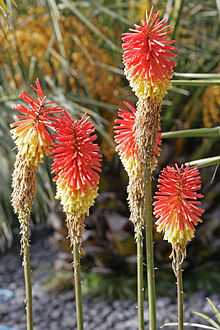Kniphofia
| Kniphofia | |
|---|---|
 | |
| Fiery colored Kniphofia | |
| Scientific classification | |
| Kingdom: | Plantae |
| Clade: | Angiosperms |
| Clade: | Monocots |
| Order: | Asparagales |
| Family: | Xanthorrhoeaceae |
| Subfamily: | Asphodeloideae |
| Genus: | Kniphofia Moench |
| Species | |
|
See text. | |
Kniphofia /nɪpˈhoʊfiə/,[1] also called tritoma, red hot poker, torch lily, knofflers or poker plant, is a genus of flowering plants in the family Xanthorrhoeaceae, subfamily Asphodeloideae,[2] that includes 70 or more species native to Africa. Herbaceous species and hybrids have narrow, grass-like leaves 10–100 cm (4–39 in) long, while perennial species have broader, strap-shaped foliage up to 1.5 m (5 ft) long. All plants produce spikes of upright, brightly colored flowers well above the foliage, in shades of red, orange and yellow, often bicoloured.[3] The flowers produce copious nectar while blooming and are attractive to bees. In the New World they may attract sap-suckers such as hummingbirds and New World orioles.
The Kniphofia genus is named after Johann Hieronymus Kniphof,[4] an 18th-century German physician and botanist.
Cultivars
In addition to the species, many named cultivars of mixed or uncertain parentage have been selected for garden use. The following have gained the Royal Horticultural Society's Award of Garden Merit:-
- 'Bees' Sunset'[5] (yellow)
- 'Brimstone Bloom'[6] (sulphur yellow)
- 'Buttercup'[7] (clear yellow)
- 'Nobilis'[8] (evergreen, orange and yellow)
- K. rooperi[9] (evergreen, oval spikes of red and yellow flowers)
- 'Royal Standard'[10] (red and yellow)
- 'Samuel's Sensation'[11] (tall herbaceous variety, scarlet flowers fading to yellow at the base)
- 'Sunningdale Yellow'[12] (orange-yellow)
- 'Tawny King'[13] (cream/brown)
- 'Toffee Nosed'[14] (cream/brown)
- 'Wrexham Buttercup'[15] (yellow)
Some species
- Kniphofia brachystachya
- Kniphofia caulescens
- Kniphofia foliosa
- Kniphofia hirsuta
- Kniphofia rufa
- Kniphofia sarmentosa
- Kniphofia stricta
- Kniphofia triangularis
- Kniphofia uvaria, Torch lily
- Kniphofia reflexa (endangered)[16]
Gallery
-

Yellow Kniphofia
-

'Shenandoah' Red Hot Poker
-

Kniphofia foliosa in Simien Mountains National Park, Ethiopia
References
- ↑ Sunset Western Garden Book, 1995:606–607
- ↑ Stevens, P.F. (2001 onwards), Angiosperm Phylogeny Website: Asparagales: Asphodeloideae
- ↑ RHS A-Z encyclopedia of garden plants. United Kingdom: Dorling Kindersley. 2008. p. 1136. ISBN 1405332964.
- ↑ "Google Translate". Translate.google.com. Retrieved 2012-05-13.
- ↑ "RHS Plant Selector - Kniphofia 'Bees Sunset". Royal Horticultural Society. Retrieved 20 May 2013.
- ↑ "RHS Plant Selector - Kniphofia 'Brimstone Bloom'". Royal Horticultural Society. Retrieved 20 May 2013.
- ↑ "RHS Plant Selector - Kniphofia 'Buttercup'". Royal Horticultural Society. Retrieved 20 May 2013.
- ↑ "RHS Plant Selector - Kniphofia 'Nobilis'". Royal Horticultural Society. Retrieved 20 May 2013.
- ↑ "RHS Plant Selector - Kniphofia rooperi". Royal Horticultural Society. Retrieved 20 May 2013.
- ↑ "RHS Plant Selector - Kniphofia 'Royal Standard'". Royal Horticultural Society. Retrieved 20 May 2013.
- ↑ "RHS Plant Selector - Kniphofia 'Samuel's Sensation'". Royal Horticultural Society. Retrieved 20 May 2013.
- ↑ "RHS Plant Selector - Kniphofia 'Sunningdale Yellow'". Royal Horticultural Society. Retrieved 20 May 2013.
- ↑ "RHS Plant Selector - Kniphofia 'Tawny King'". Royal Horticultural Society. Retrieved 20 May 2013.
- ↑ "RHS Plant Selector - Kniphofia 'Toffee Nosed'". Royal Horticultural Society. Retrieved 20 May 2013.
- ↑ "RHS Plant Selector - Kniphofia 'Wrexham Buttercup'". Royal Horticultural Society. Retrieved 20 May 2013.
- ↑ "Kniphofia reflexa". Redlist.org. Retrieved 2012-05-13.
